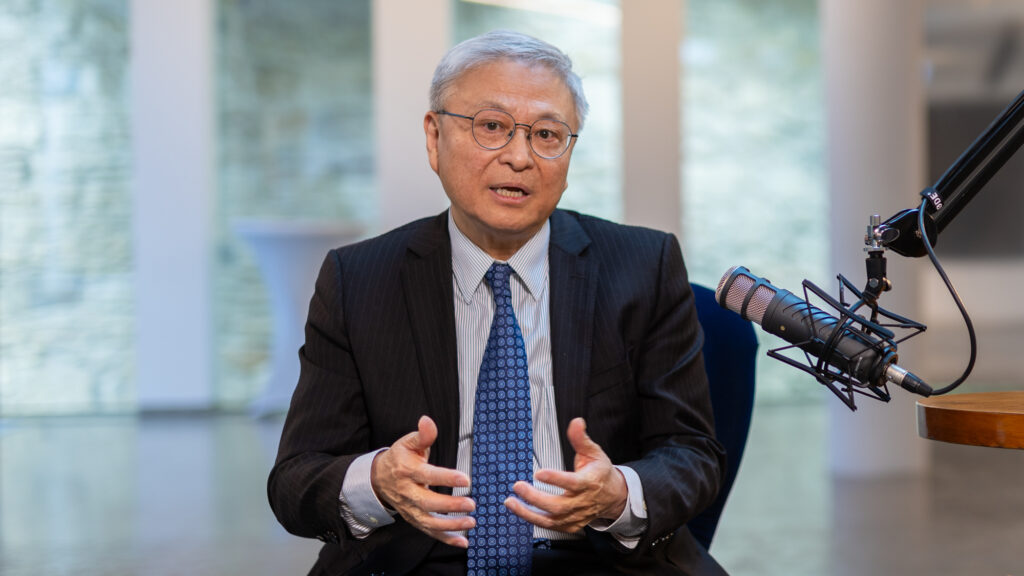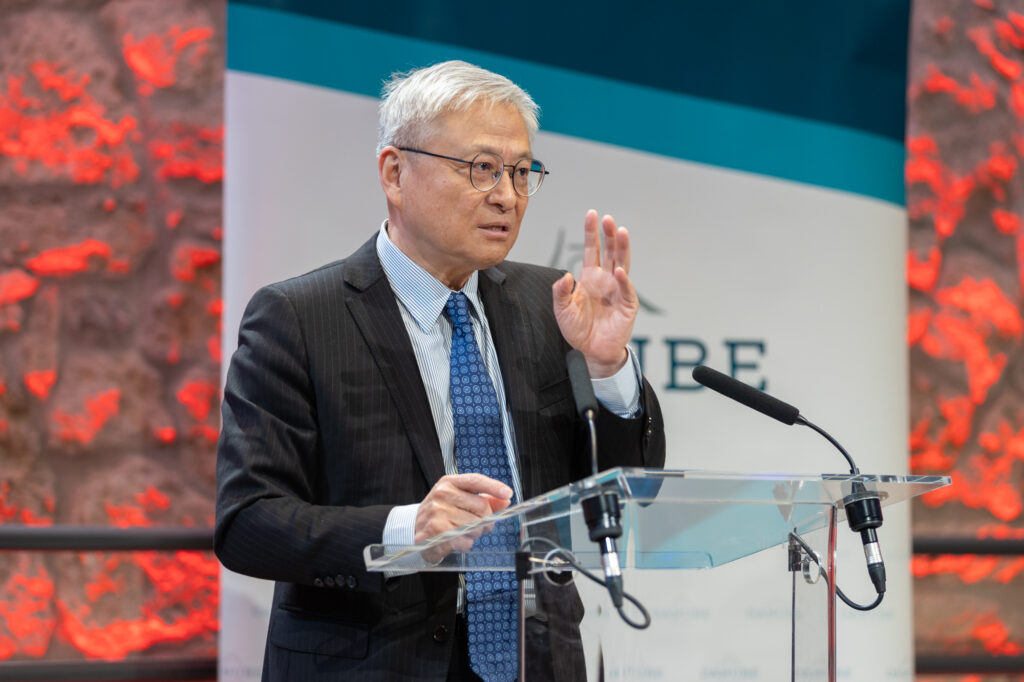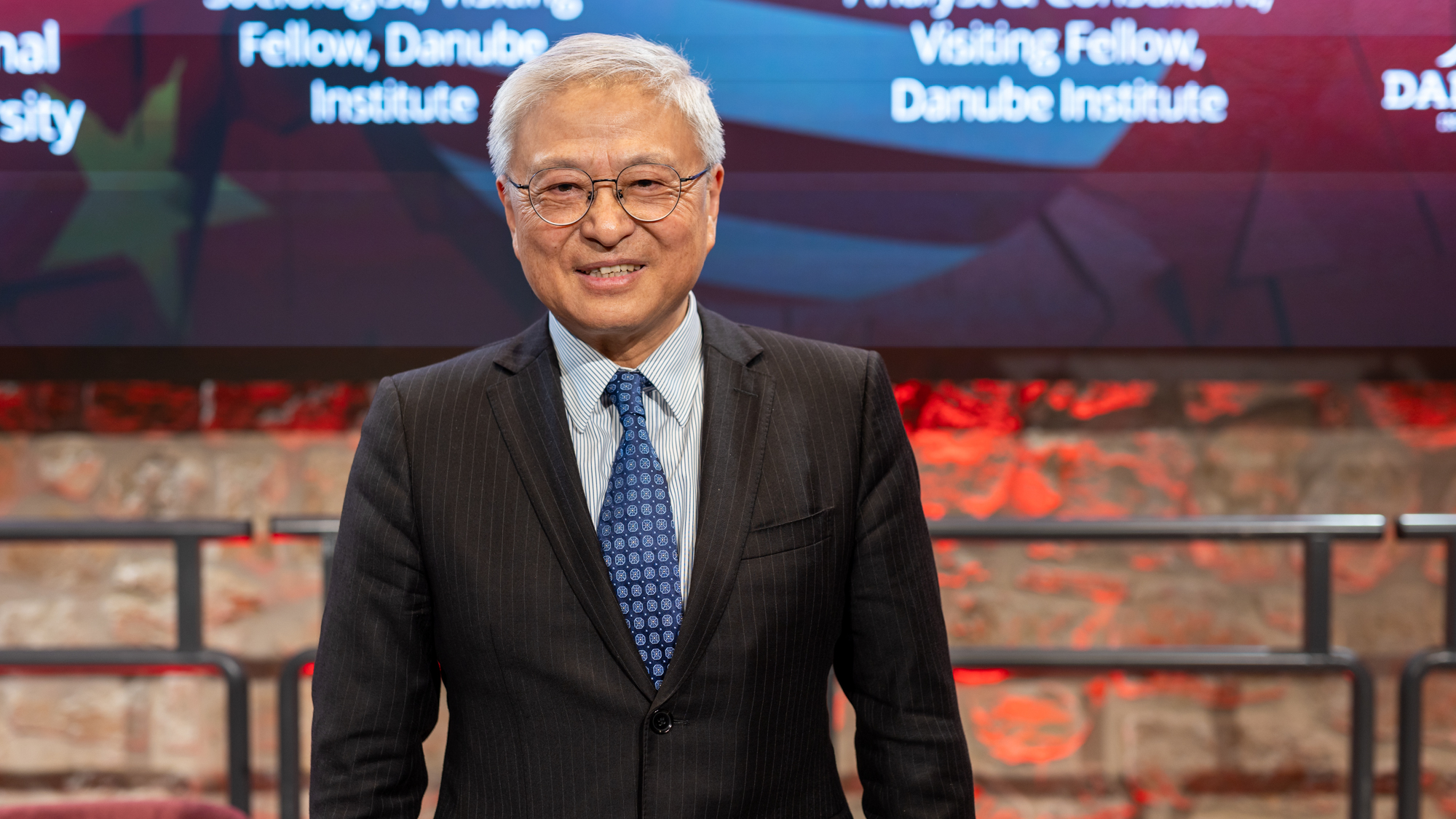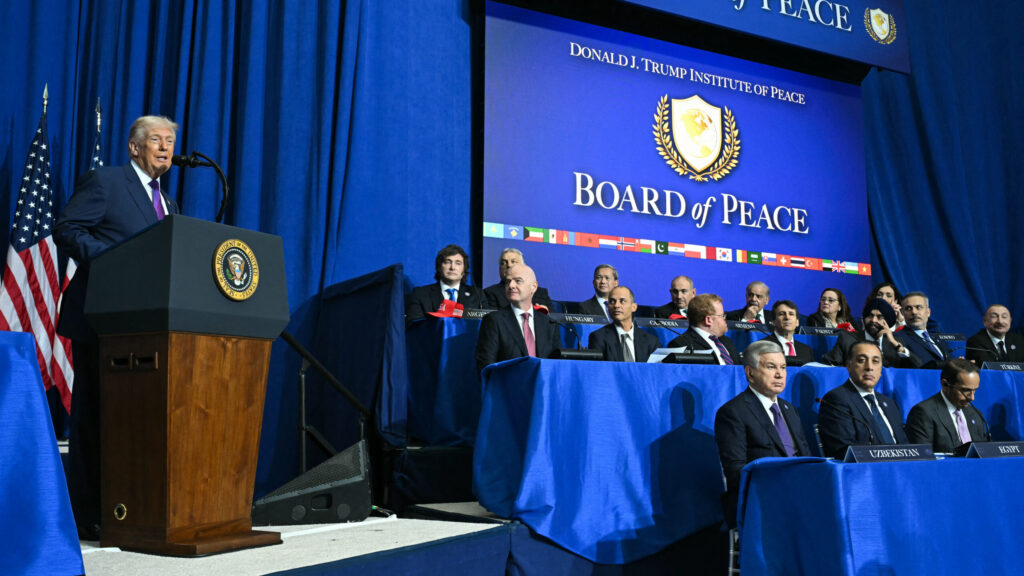Yan Xuetong (1952) is a Chinese political scientist and serves as a distinguished professor and the Director of the Institute of International Studies at Tsinghua University. He is the secretary-general of the World Peace Forum, which is one of China’s most important international relations conferences. Yan’s 1996 book Analysis of China’s National Interests was the first Chinese-language book to systematically analyse the titular subject. In 2008, he was named as one of the world’s Top 100 Global Thinkers by the Foreign Policy. Yan holds a BA in English from Heilongjiang University, an MA in international politics from the Institute of International Relations, Beijing, and a PhD in political science from the University of California, Berkeley.
***
Should we be afraid of China?
Well, China and Hungary have a very good relationship, and we regard Hungarians as our friends. So, I don’t think friends should be scared of, or fear each other, so as long as we’re friends, I don’t think people need to be afraid of China’s rise.
I’ll tell you some stereotypes that Western politicians, decision-makers, journalists, and academics often say are the reasons why we need to be afraid of China. One of them is economic: cheap Chinese products appear on the European or American market, and this situation causes some losses to the manufacturers of Europe and America. This is the reason why President Trump started the trade war with China. Should we be afraid of the cheap Chinese products?
Well, I think that there’s a lot of misunderstanding about business, and I don’t think anyone fears going shopping and giving cash to the shopper, and the shopper gives them goods. And no one fears using cash to trade for goods. So, actually, China just produces goods for cash. So, I think this is business, and it’s a very normal thing; this kind of exchange has been carried out for 1,000 years.
‘As long as we’re friends, I don’t think people need to be afraid of China’s rise’
So why has Trump suddenly become worried about China’s products? Because the US wants to maintain its dominance in the world. They want others to support the US so the US can give orders to them. That’s why he said they can’t allow China’s products, because maybe someday they can no longer order from China. Actually, it is very possible, and not far in the future, that the US will no longer be able to order from China. Even in the 1950s, when China was really poor and we had a war with Korea, even then, the US could not order from China. So, to my understanding, the question is not the price of the products; the question is what kind of relationship we will have. Do we want to be friends, or do we want to be enemies? Or do we want to have a healthy competition, or do we want to see a worst-enemy type of competition?
So, how do you describe yourself in this relationship?
We have friendships with most countries. And I say, Chinese people have friendships with individuals in every nation. The problems are between the policymakers, and nowadays, the Trump administration has adopted a very hostile policy towards China, and that makes the relationship no longer a friendship, but at least a competitive one, and possibly confrontational. In this way, China can no longer regard the Trump administration as a friend. And we are concerned that we can improve our relationships with Europeans, Japanese and the ASEAN countries, and others everywhere in the world.

But there can also be a final deal with the US government. What do you expect from the talks? And if the talks can’t lead to viable solutions, what would be the outcome of the tariff war in the short term?
This is just the first step to maintain the official channel of dialogue. You cannot expect the two countries to reach any concrete agreement just by one talk or discussion. If they cannot reach an agreement, I think it is natural and not a disaster, because they can have another meeting. And if they cannot reach an agreement next time, they can have a third or fourth round, as long as they continue this kind of political dialogue, they can find some solutions in the future.
‘The Trump administration has adopted a very hostile policy towards China, and that makes the relationship no longer a friendship’
The second topic is digitalization, the ownership of the knowledge. China is very strong in artificial intelligence, innovation, and technology, and those who own the technology rule the world. And if China is the one that owns the knowledge and rules the world, it will be a different world for us, many fear. Don’t you think so?
I think this is absolutely wrong. No matter whether in modern times or in ancient times, there have always been countries with more advanced technology than others. This is nothing new. They are just different countries. For instance, during the post-Cold War period, the US had a more technological advantage over other countries, and the Chinese never feared that. We think if someone has better technology than we do, then we should learn from them, and we should try to compete and catch up. So, when some people fear that they don’t have the same advanced technology as China has, that means a problem with their mentality; they don’t know how to deal with the situation. It’s impossible to make every country have the same technological capability. There will always be someone with more advanced technology than others. That’s normal. So, we should adjust our mentality to these facts.
I see. The third pillar of the controversy is security and politics. Many Western politicians watched carefully when your country reclaimed the territory of Hong Kong, and what they saw during the last decade or so was that the political system changed to resemble communist institutions. Japan, Taiwan, South Korea, the Philippines and other Asian countries are worried about a phenomenon in which China conducts military exercises near others’ sovereign waters, or transforms coral reefs into naval bases in disputed areas. Or, in the Pacific region, small countries are shifting their allegiance from the US to China, because China, through economic aid, gains political influence there.
I think this question is a little bit complicated. First, I think your question represents many people’s misunderstanding of the facts. Hong Kong is a city of China, it is not a state. Taiwan is a province of China, it is not a state. And China’s naval ships sail in the South China Sea, which is public water, not the sovereign water of any country. So, I think there’s a misunderstanding.
‘We think if someone has better technology than we do, then we should learn from them, and we should try to compete and catch up’
Japan or Australia also complain about these violations, and they are independent states.
Japan is a state, the Philippines is a state, South Korea is a state, and Vietnam is a state. Hong Kong is not a state. Taiwan is not a state, and the South China Sea is not a sovereign water of the Philippines. So, these are the facts. Because Hong Kong is a Chinese city and Taiwan is a Chinese province, there are no territorial disputes. These territorial sovereignties are owned by the Chinese government. There’s no doubt, no question, no challenge on this legitimacy. So, the problem is that the regime in Taiwan, in this province, wants to achieve independence. Like you have a situation in the UK, Northern Ireland, or in Spain, there is a region that seeks independence. So, secessionism is the issue, not a territorial dispute.egime in Taiwan, in this province, wants to achieve independence. Like you have a situation in the UK, Northern Ireland, or in Spain there is a region that seeks independence. So secessionism is the issue, not a territorial disputes.

Let’s separate the two issues, let’s put Taiwan into a different question. First, let’s talk about Japan’s, the Philippines’, and Australia’s fear of the Chinese threat. Is it a real sense of threat, or not?
I think the current governments of these countries, Japan and the Philippines, use the territorial disputes as an instrument to consolidate their domestic rule. It has nothing to do with the territorial disputes. For instance, China, Japan, and the Philippines have experienced these kinds of maritime disputes for several decades. We have a very close relationship. We cooperate with each other. Sometimes we cannot.
‘Hong Kong is a Chinese city, and Taiwan is a Chinese province…These territorial sovereignties are owned by the Chinese government’
My personal understanding is that when the governments of these countries want to cooperate with China, they just say that we can settle these disputes for the sake of our economic and political security relations. But when they have domestic problems, they use this kind of issue to legitimize their tough policy against China, to show their toughness, to attract voters to vote for them. So, I think these matters are mainly caused by their domestic politics, rather than by international relations.
Many Western analysts say that in 10 years’ time, there will definitely be a Chinese step to enforce, even militarily, the One China principle on Taiwan. Will it be a military conflict, or not?
Well, what you said, I’ve heard of for more than three decades. People have said China is going to take over Taiwan within ten years. Actually, this issue has existed there for more than seven decades. Just imagine if a military clash or war takes place in this region. However, for the past seven decades, it hasn’t happened. I don’t think I can predict well, but I don’t think this kind of disaster will happen during the years of the Trump administration.
What is the big picture? What is the big strategy, the foreign policy plan of China? Is it to achieve a global leading status, or to be satisfied if the American hegemony fails? What exactly is the goal that China wants to achieve?
I think the Chinese government clearly advocates for a multipolar world. This means having some major powers that develop peaceful relationships, and collectively shape the global order that is relatively equal between the strong and the weak. That’s the picture. And China certainly do not like American hegemony. China is unhappy to see the world dominated by the US and that it has to obey US orders—this is what China, the Chinese government and the Chinese people dislike. Meanwhile, China has clearly told the world that it does not want to be another United States. We do not want to replace the US hegemony with the Chinese hegemony. We think the US leadership is wrong. This type of leadership is harmful, not helpful.
‘We do not want to replace the US hegemony with the Chinese hegemony’
So, China said that we need a form of collective leadership of major powers to provide public goods for the whole world, and to maintain a relationship based on the principle of peaceful coexistence.
You mentioned a multipolar world, not a bipolar world. Who are the poles? Because we see one failing hegemony, the US, alongside a rising star, China, and there is another rising star, India. What else?
Personally, I think that regarding comprehensive national power, China and the US are the two existing poles. There are no other existing comprehensive power poles at present. And if we’re talking about the economic poles, the EU could be regarded as one. So, we have the EU, China, and the US—three economic poles. If we’re talking about military power, there could also be three: China, the US, and Russia—three military poles. Personally, I would prefer to apply the standard of comprehensive capability, which means the composition of military, economic, political, cultural and technological power. So, if you look at the capability comprehensively, I think there are only two existing poles at the moment. And if you ask me who could become another potential pole in the future, it really depends on those countries themselves, who can develop faster, and who can catch up with the advanced countries.
Could it be Japan, Australia or India?
If you ask me what will happen in the next 10 years, I think you will not find any country that has the capability at the same level as the US and China. capability at the same class as the US and China.

My last question is about Hungary. Why is our country important to China? Is it because we are EU and NATO members, so you have a gateway to the European markets, or is it a bit more than that?
Even if Hungary had withdrawn from the EU, we would still have considered Hungary important. We regard all friendly countries as important. It’s not because you have a large market, or we can gain anything from Hungary economically, or by security, we think that just because we are friends. Because the Hungarian government has taken a friendly attitude towards China, it wants to be China’s friend. So, we have one close friend in Europe, and that’s a good thing.
Western allies of Hungary often accuse the Orban cabinet of being a Trojan horse for various foreign interests like China and Russia. Is it a true accusation, or not?
I think many NATO and EU members, many countries, feel puzzled by your foreign policy. How can you maintain equally friendly relationships with China, Russia and the US, while these three states confront each other? It’s very strange. I think your government has adopted a quite clever policy. Not only have China and the US started a trade war, but Russia and the US are actually in a war in Ukraine, so maintaining the balance is very difficult. So, I think that Hungary has adopted a very clever strategy. Second, when other countries criticize Hungary, you should be concerned about whether your policy benefits your country or not. If your policy benefits your people, then you might ask why you shouldn’t behave that way. If your policy harms your people, you certainly should listen to others.
‘Maintaining the balance is very difficult. So, I think that Hungary has adopted a very clever strategy’
So that should really be decided by your government, how you view the function of your policy, whether it benefits your people or harms them. My understanding is that foreign policy should be driven by national interest.
You then agree with the Hungarian government, and in fact, you agree with the American government too, in this sentence.
Wait a second. Every country’s foreign policy should be driven by national interest, but it doesn’t mean that to protect your own interests, you can hurt others’ interests. These are two things. Everyone should work hard to earn money, but it doesn’t mean that we can steal others’ money. So, when Trump’s policy claims to protect American interests, and the fact is that this policy is achieving American interests at the cost of harming others’ interests, that is wrong. Just like with individuals, you can’t say that to improve your life at home, you can make your neighbours poor. There are two things. Serving your own country’s national interest is one thing, but undermining others’ interests while you pursue your own is another.er.
Watch the full podcast below:
Should we be afraid of China? | Danube Lectures
Listen on Spotify: https://www.youtube.com/watch?v=f-F69–azxc 0:00 – Intro 0:50 – Should we be afraid of China? 1:45 – Should we be afraid of the cheap Chinese products? 3:28 – How does China describe its relations with the world? 4:37 – What could be the outcome of the negotiations between the Chinese government and the Trump administration?
Related articles:







